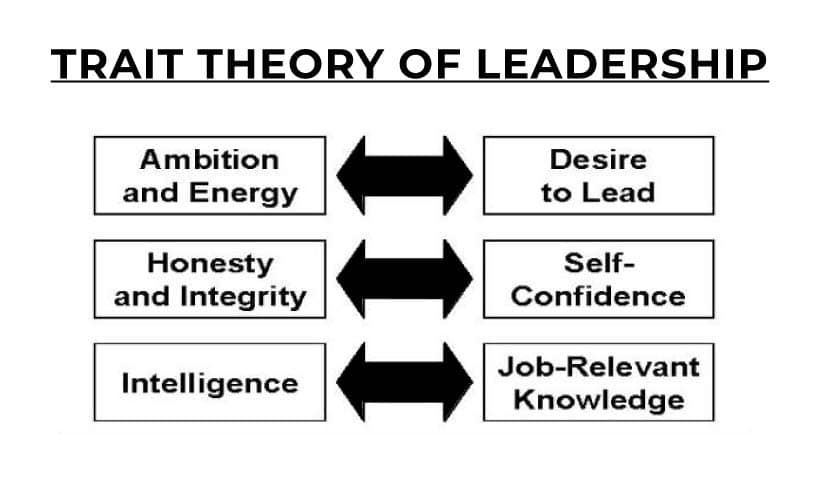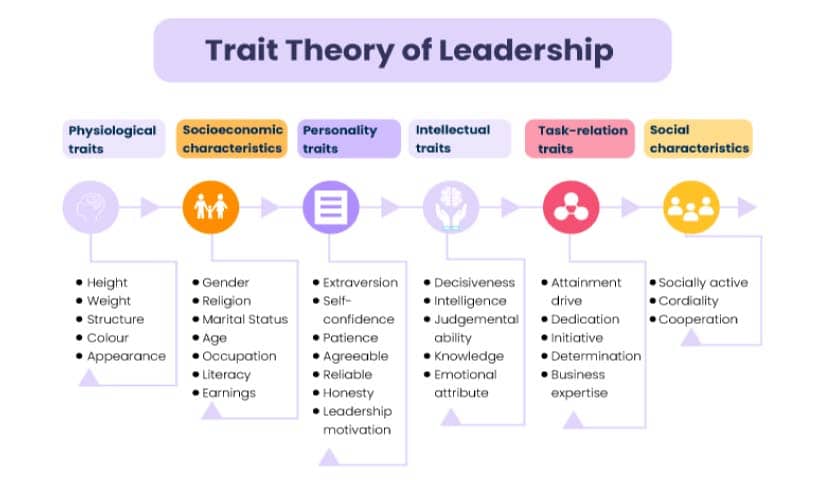How much of your personality is shaped by your upbringing and genetics to be a leader? Before answering this question, we suggest you comprehend the trait theory of leadership deeply. Truly, it has emerged as one of the most prominent theories of leadership and management. This theory explains how specific traits and personality traits are affected by certain factors.

Everyone has leadership qualities, with some differing from others. However, the common thread among leaders is their ability to inspire the people around them to do more rather than less. If out of these qualities, this theory defines significant traits of a leader. Here in this treatise, we will rummage the trait theory with a thoughtful description.
Characteristics of Trait Theory of Leadership
At its core, leadership is a personal responsibility. It involves a man putting in the time and effort to make sure that he behaves with society and organization. What is more, it involves recognizing the other dimensions of leadership. For instance, we can name that of followership and also that of virtue, which comes with every personal decision made.
Currently, the trait theory is emerging as an effective tool for leading an organization. Before following this theory, one must comprehend its characters fully. In this manner, it will be much easier to bring out the best outcome of its implementation. So, take a gander at the following lines.
• Eagerness:
Firstly, eagerness to accept responsibility is an important characteristic of trait theory. It refers to the willingness to take responsibility for one's own mistakes and the willingness to have responsibility for errors made by others. It makes the person a leader who is honest and holds no grudges.
The leaders should be enthusiastic to carry out their core job. Especially, they must look on to leading their teams for the future. Likewise, they should have the ability to manage their team members and have an outcome-oriented philosophy in their approach.
• Consistency:
As a leader, you need to be impending in your role. It also does not help if you are always changing your style. You should only manage your work and life with consistent rules and a few core values. In the trait theory, you will find that consistency is a core character.
It strongly influences leadership effectiveness. Leaders need to exhibit their consistent behaviors and attitudes while they attempt to influence others in the organization. Here, the most important fact is that the leaders usually work based on their habitual tendency. In fact, it remains constant in most cases. Therefore, consistency is a core part of trait theory.
• Emotional Stability:
Leadership possesses a complex set of skills. Although it can be daunting to gain an understanding of how one can become a leader, it can help you. Besides, it explains how leadership personality affects social behavior and decision-making. In addition to testing for traits such as empathy, conscientiousness, and extroversion, it looks at overall behavior or tendencies.
You know what; controlling your emotions is a piece of cake with many techniques. However, trait theory can describe the ways to identify your resting and optimal levels of mood. You may aim at building an emotional stability profile to keep a check on your emotional state.
• Individual Differences:
The trait theory states that leaders are decisive, powerful, and important. Besides, it introduces individual differences as a vital part of the theory of leadership. It states that people may act differently depending on how they relate to particular situations, such as their gender.
Actually, being a leader is not as easy as it looks at first glance. Someone may become a leader by nature or if they are born to be one. But, what is certain is that leaders are apparent to have certain traits. In this way, the trait theory holds individual differences as a core point.

Application of Trait Theory of Leadership
Most importantly, trait theory is a framework of personality research. It describes personality as a multifaceted behavior. In particular behavior, traits determine who a person is, how they interact with others, and what they will do. This theory emerged to explain attraction and selection processes. But yet, it is really significant in the study of leadership success.
However, trait theory is a branch of psychology developed by Chester and O'Reilly. It holds that leadership is caused by a mix of personality and situational factors. This theory posits that a leader's traits serve as an important determinant of the follower's attitudes. The leaders need to be certain of their own leadership style. Besides, they need to possess the attributes and skills necessary for leadership to influence others effectively.
Leaders can set their management style based on the trait theory. In addition, leadership holds a direct impact on an organization's growth and is widely studied in modern organizations. This theory provides a new way to understand leadership. You know what; they can apply trait theory of leadership to identify, quantify and measure leadership effectiveness.
On the other hand, it views personal characteristics or attributes as a factor in leadership abilities. You may divide personality traits into two categories, such as personal resources and personality factors. Personal resources are the fundamental personal qualities and skills that influence a leader's performance. Conversely, personality factors are characteristics that influence and shape the leader's behavior and decision-making.
Criticism of Trait Theory of Leadership or Limitations of Trait Theory of Leadership
First and foremost, it is one of the strongest and most effective leadership theories ever crafted. But, it has been facing lots of criticism because of its limitations. Truly, its assessment is so subjective. It is because; we may see two or even three different versions of the same incident with different outcomes. But, if we are to stick to the traditional theory rather than the updated version, it appears on shaky premises.
Leadership theories are developed from certain traits that are believed to be indispensable to success in leadership. But, do the typical leaders we come across in the real world conform to the findings of these theories? It is what we will try to find out here. By exploring the limitations of trait theories, it draws your attention to the behavioral differences that exist between people. In which the differences hold true regardless of their natural traits.
We know that there's no cookie-cutter solution that will suit every human being and organization. But instead, we decide on the most crucial way that fits each and every one. However, the trait theory has failed to take situations into account. We have seen situations where this theory has not worked much well for large companies.
According to trait theory, behaviors are selected by the traits of the individuals in a group even without external motivational factors. Leaders' traits are to be responsible for the performance of their groups and teams in organizations. But sometimes, trait theory is a week in describing how leaders' traits affect the outcomes of groups and teams in organizations.
Advantages and Disadvantages of Trait Theory of Leadership
Without a background in psychology and human behavior, it is hard to imagine what kind of leaders the world can produce. How leaders bring about change is at the core of their effectiveness. Basically, effectiveness is predicated on the type of leadership style they exhibit and the way their followers respond to it. People who create an atmosphere that tangibly encourages people to achieve new things through creative thinking are called 'trait-oriented' leaders.
Keeping this thing in mind, one must explore both sides, such as the advantages and disadvantages of a leadership theory. In this continuation, we will explain every aspect of the trait theory of leadership here. Let's have a look at the next lines.
Advantages:
• Achievement Driven:
Achieving goals, delivering performance, and empowering employees are the three things that drive humans to act better. The service and manufacturing industries are already getting on board with the trait theory of leadership. Here, we look at this fact as the most crucial advantage of trait theory. The road of achievement can be vary based on the implementation of leadership style.
Most importantly, trait theory is a key model to achieve the goal of the organization. Here, the particular traits of a leader make it easier to run towards the desired destination. It is because; inborn leadership attributes are really powerful. After that, the robust tool can lead you to your goal successfully.
• Naturally Pleasing:
Everybody wants to be a leader. We desire leaders who are charismatic, powerful, above-average people. Human nature being what it is, leadership is something we all want to pursue in all its permutations. Fundamentally, leadership skills require leading others to success. Everyone wants natural, easy, and effortless leadership.
In this case, the trait theory is an unparalleled way of giving weight to the forms of leadership. Truly, it is naturally pleasing to the people under trait leaders. If you like to implement this great trait theory of leadership, you can do it. In most cases, it eases the stiffness of the employees while carrying out their jobs. Therefore, it is a core advantage of trait theory.
• Cognitive ability:
Well, it is true that personality traits define individual characteristics. It is mostly because of how predictive they define the approach of their leadership. But, why do personality traits predict so well? Similar to intelligence, it is being a cognitive ability that makes you more proficient at adapting and coping with change. Thus, this theory explores the most crucial part of the working process.
However, science has revealed how cognitive ability can determine a leader's leadership capabilities. After that, it has got a certainty that cognitive ability is a true fact for this theory. By using this skill, a leader can analyze the current situation and set strategies for the next movement. Therefore, this advantage of the theory is a praiseworthy tool for better management of the workforce.
Disadvantages:
• Lack of collaboration:
The trait leader-follower model can be a useful starting point for studying leadership. Though this theory is the dominant model in management philosophy, there are a few people who disagree with its basis. However, its limitations in understanding leadership have become increasingly evident over time. There is the view that trait leaders can be an obstacle to effective teamwork and collaboration.
In this stage, we explore that trait leaders are not disabled in their ability to collaborate. But rather than being able to work together effectively, they trade on their traits to exploit the groups they lead. Truly, it is a common practice within strategic leadership that some business leaders hike up their stature through fear tactics. For instance, the leaders may have paranoia and fear of losing power.
• Immature Interpersonal skills:
A leader's personality involves a number of traits that help determine leadership ability. However, this research reveals that a major disadvantage of trait theory is immature interpersonal skills. Therefore, a finding also shows that the best performing leader is those with mature interpersonal skills. Some experts state that trait theory does not hold the key to great leadership.
Mainly it is because; it does not assist in skill development which is a central component of effective leadership. The best leaders are typically not those who possess great personal qualities but those with disciplined skills. But, it reduces leadership to a personal attribute, ignoring this crucial fact.
• Poor Judgment:
The leaders who are high in traits of poor judgment are those who are prone to making the wrong decisions. These leaders typically lack the ability to think critically and make informed decisions. Sometimes, trait leaders contain and experience poor judgment.
Most of us have a disposition of thinking in a very absolute and coarse manner. We then tend to judge other people on the basis of their actions and conduct. Thus, these things lead to a gamble in their ability to perform. Even worse, it may lead us to the wrong conclusion about people's character. That is why; trait theory can be risky in some cases.
Trait Theory of Leadership Examples
Trait theory has a rich history of over a century. The concept of leadership and leadership theory faces external factors that could have made a difference in the way trait theory is shaped. These external factors can come as a reflection of trait theory's impact on the nature of leadership. People who express innovative ideas, which develop complex ideas, can have a place in the history of trait theory.
Numerous stories of great leaders emerge throughout history. However, these leaders were far more than that. They had an impact on society and transformed lives, politics, and the world. The most famous of these towering figures who dominate our memory is Steve Jobs. He has often been regarded as a charismatic leader because of his charisma and the way he influenced people.
A good leader must have all the right qualities, or else he will not be able to lead his team effectively. The two founders of Google, Sergey BRIN and Larry Page, had distinct and inborn leadership traits. After that, they brought the company to success. Therefore, their leadership examples carry a special level of interest and fascination with their followers.
Conclusion
Finally, the trait theory of leadership is a leadership theory that explains the different traits of a leader. It is indispensable that you are able to find the right fit between your leadership style and the traits. Each person on your team will have assorted needs and expectations. As a leader, it is up to you to lead your team with a better collaboration of personal attributes. So, implementing trait theory can assist you in being an influential leader.








